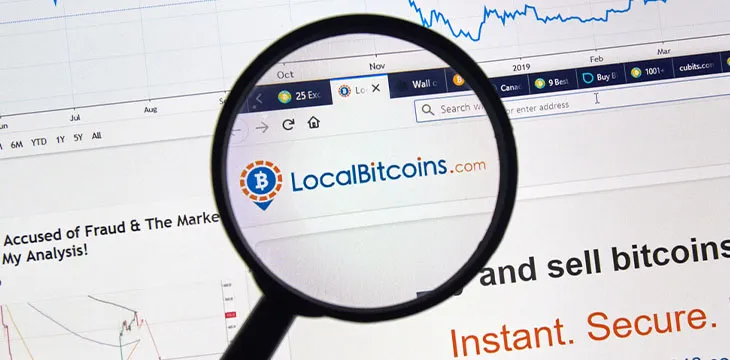|
Getting your Trinity Audio player ready...
|
LocalBitcoins, one of the world’s oldest digital asset peer-to-peer (P2P) trading platforms, is bidding farewell after a decade of operations.
Following its launch in 2012, LocalBitcoins became increasingly popular worldwide. Its easy-to-use platform was a godsend to many newbies who used it to buy their first digital assets. Being a P2P platform, it allowed users to pay for these assets in various localized payment methods, from bank transfers to mobile money.
However, a decade later, the curtains have fallen on LocalBitcoins.
— LocalBitcoins (@LocalBitcoins) February 9, 2023
“…regardless of our efforts to overcome challenges during the ongoing very cold crypto-winter, we have regretfully concluded that LocalBitcoins can no longer provide its Bitcoin trading service,” the Finnish company stated.
It encouraged users to hasten their fund withdrawals, giving them 12 months to complete the process.
The company suspended new signups on February 9, with suspension for trading and other wallet services set for February 16.
While the ‘crypto winter’ exacerbated the company’s issues, the demise of LocalBitcoins had started way earlier. At its peak in 2018, it was processing over 2,400 BTC in weekly trading volume. This figure more than halved in the next few years, and by 2021, it struggled to hit 1,000 BTC weekly. In its last week, only 283 BTC changed hands on its platform, worth around $6 million.
LocalBitcoins is one of the platforms that has stuck to BTC through the years, even as the world moved on from pure speculation and started seeking utility in digital assets. This has proven to be its downfall, with the ‘crypto winter’ the final nail in its coffin.
The company was also favored for its lax KYC (Know Your Customer), but with regulators in its native Finland and elsewhere going after virtual asset service providers (VASPs), it was forced to tighten these measures. This saw its trading volume dip significantly as well.
While it could have evolved over time and offered digital assets that offer actual value–possibly tap into a $500 billion remittances market desperate for a revolution—it stuck to its original target market of speculative buyers.
LocalBitcoins brought digital assets to the developing world
The demise of LocalBitcoins was inevitable. However, many will fondly remember it, especially in developing nations, for making digital assets available way before the centralized exchanges made their way there.
In Kenya, the platform was popular. The East African country is a peer-to-peer trading hub, and in 2020 and 2021, it was ranked the world leader in P2P volume by Chainalysis.
“I started my crypto journey with LocalBitcoins five years ago. Back then, it was the only option here, and it was easy to use for a noob like myself,” Simon Kiguru, a public relations expert working with blockchain projects, tells CoinGeek.
LocalBitcoins allowed Kenyans to make payments P2P through M-Pesa, the mobile money service used by over 80% of the country’s population. This, coupled with an ability to make purchases as low as $10, made the idea of buying digital assets seem less daunting for most Kenyans, Simon added.
In Venezuela, LocalBitcoins played a big role in the digital asset revolution. At one point, Venezuela, Russia, and Colombia accounted for more than 40% of the platform’s volume.
“LocalBitcoins was the main reason for the huge use of [BTC] in Venezuela during the 2017-2019 period. The huge volume moved in the country made the world realize that [BTC] was being used in Venezuela,” Caracas Blockchain Summit founder Ernesto Contreras told one outlet.
LocalBitcoins later axed Russia from the platform as part of the sanctions against the country after it invaded Ukraine.
Watch: Remittances & Rewards

 08-17-2025
08-17-2025 





